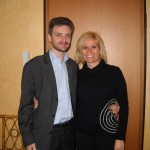Italian Magnum Opus
In A Brief History of Time, Carl Sagan introduces the Cambridge Professor of Mathematics, Stephen Hawking, by saying something thoughtful: “We go about our daily lives understanding almost nothing about the world” (ix). Maybe Sagan was speaking more of himself than for Christians (see Romans 1:19-21). But, it does appear that he had a valid point. Our problem with a purely  material position of the world is that it is strongly tilted toward a set of presuppositions which exclude outside forces (namely the Lord God) from the git-go.   That is why, when people sometimes state, “I believe in Science,” they are actually admitting to a higher power that is observable. An immediate problem here involves the nature of God being spirit, not chemical or a mere force field (John 4:24). So, end of discussion, right?
material position of the world is that it is strongly tilted toward a set of presuppositions which exclude outside forces (namely the Lord God) from the git-go.   That is why, when people sometimes state, “I believe in Science,” they are actually admitting to a higher power that is observable. An immediate problem here involves the nature of God being spirit, not chemical or a mere force field (John 4:24). So, end of discussion, right?
The world from a physical standpoint does have four fundamental forces: (1) Gravitational (2) Electromagnetic (3) Weak Nuclear, and (4) Strong Nuclear. The Bible writer to the Hebrews, in 1:3, 10-12; 10:3 , presents Christian faith as including a cosmological view of things. So, those forces for Hawking are contained; while for Christians they are contingent. Allowing for this data, we may move into the discussion of God in history.
There appear to be some firm components in the mind of the apostle Paul. One such idea is that God is at work in the world. But, even before Paul, we may delve into what Jesus himself thought of the world. What kind of a place is it  anyway? For, to think as Jesus thought, to feel as he felt, and to see as he saw , we will need to acquire his set of beliefs (or, belief system). John 5:17 captures this assumption in a few words. Jesus believed that the Father was at work in the world, and that he was also involved in this magnum opus. When the gospel is preached and people respond in baptism, they are raised by the power of God out of the watery grave of Christian baptism. This is the Lord’s continuation of John 5:17. This is furthermore a call to believers to participate in the work of God (opera in Italian), by submitting to his plan. If it begins here, commencing in baptism, it takes the believer far away and yet nearer to the one who calls. This may be seen in Philippians 1:6, where the work of God in history has high continuity with John 5:17 and Colossians 2:12.
anyway? For, to think as Jesus thought, to feel as he felt, and to see as he saw , we will need to acquire his set of beliefs (or, belief system). John 5:17 captures this assumption in a few words. Jesus believed that the Father was at work in the world, and that he was also involved in this magnum opus. When the gospel is preached and people respond in baptism, they are raised by the power of God out of the watery grave of Christian baptism. This is the Lord’s continuation of John 5:17. This is furthermore a call to believers to participate in the work of God (opera in Italian), by submitting to his plan. If it begins here, commencing in baptism, it takes the believer far away and yet nearer to the one who calls. This may be seen in Philippians 1:6, where the work of God in history has high continuity with John 5:17 and Colossians 2:12.
Why then emphasize making new friends or teaching worldview to bambini in Italy? Of course, it is part of the plan! Sagan and Hawking have done their homework and have gained the plaudits of men. But, they have also limited their world with the rejection of any divine working in cosmos or history. That is because of the Science, right? Think again. Sagan may know why stars twinkle (to the human eye), but we know why they shine on (Rom. 1:19-21; Ps. 19:1-6; Mal. 4:2; Dan. 12:3).   The great Italian Magnum Opus does not belong  exclusively to Columbus, Galileo, or Fermi. The sub-atomic level may appear random; neutrinos, for example. But, the speed of light is still a constant (300,00 kilometers per sec.). Dare to participate in the drama. Jesus will meet you there (Jn. 5:17; Col. 2:12; Phil. 1:6). Pronto?
exclusively to Columbus, Galileo, or Fermi. The sub-atomic level may appear random; neutrinos, for example. But, the speed of light is still a constant (300,00 kilometers per sec.). Dare to participate in the drama. Jesus will meet you there (Jn. 5:17; Col. 2:12; Phil. 1:6). Pronto?